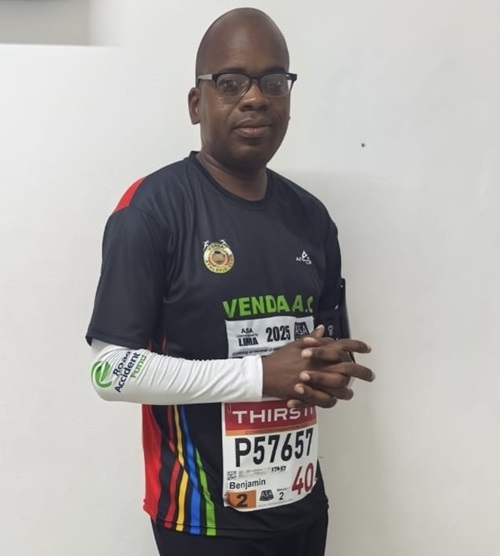When the 2025 Comrades Marathon kicked off on Sunday, 8 June, Benjamin Tjiane was running more than just the 90-odd kilometres between Durban and Pietermaritzburg. He was pursuing a goal that had started during the Covid-19 lockdowns. What began as a personal challenge has evolved into something much deeper.
“My first race was 21 km in 2019. After Covid-19, I challenged myself to run 42 and 50 km races, which were qualifying criteria for the Comrades," Benjamin remembers, “and that is how I started running Comrades marathons, realising I have endurance."
Tjiane, a Venda Athletic Club member and a North-West University (NWU) master’s-degree student, finished this year’s Comrades in a time of 11 hours, 27 minutes and 53 seconds, supplementing his collection with a fourth medal. Crossing the finish line triggered an influx of emotions for Tjiane.
“I experienced a blend of emotions, feeling joyful for having made my family proud. The fact that I was being tracked on the screen until after 17:00 was a commitment that should not be overlooked. The realisation that I am adding the fourth medal filled me with immense excitement and joy,” he says.
Tough times never last
It turned out that Tjiane had had a difficult time throughout the first 30 kilometres of the race. “Down-run races are tough, and so was this year’s Comrades Marathon. It is all about applying brakes, which result in blisters, locked feet and cramps. The first 30 km of the race was tough, if not challenging – it is 45% of the total height to climb a mountain, and having passed Polly Shortts up to Drummond was a relief.”
Tjiane is not just noticing coincidences between his academic journey and his running. His research focuses on the “Adverse reporting of media in the administration of justice: case study on criminal court matters”, a subject dear to his heart because of his extensive legal background. “I have had 27 years in the legal fraternity and have seen the negative impact of the media. It is taking a toll on us," he states, referring to the pre-emptive judgements made by journalists and individuals on social applications.
Tjiane hopes his research will bring significant transformation. “Media sensationalism will stop; the judiciary will deliver quality judgements, and citizen journalism will exist no more, especially if the Criminal Procedure Act on case reporting can be enacted.” He notes similarities between his two endeavours, stating, "A runner should never be disturbed or interfered with during race preparations," similar to how the judiciary should function without media interference.
A philosophy, formed over 27 years in the legal fraternity, has helped him get through both the hard first 30 kilometres of the down run and the methodical process of his academic study. “When the going is tough, never give up. The race hills are like my research study – I will never stop until I reach the rewarding stage,” Tjiane adds.
His commitment is evident in more ways than one. He dedicated this year's Comrades to his daughter, Lethabo, who was unable to attend because of her exam obligations.
Health and excellence
At a time when many think about taking it easy, Tjiane illustrates that life after 40 can serve as a launchpad instead of an endpoint. His dedication to running is not just for awards or records; it is also to keep up the mental and physical strength needed for academic work and professional excellence. “Running is about self-discipline and self-motivation," he states.
Whether tackling the difficult obstacles of legal research or the notorious hills of the Comrades route, he has never considered quitting, emphasising that, “After each uphill, there is a downhill (to enjoy)”.
For Tjiane, whether he is sprinting towards a finish line or pursuing a degree, the core principles remain unchanged: discipline, determination and the unshakeable belief that each difficult kilometre brings him nearer to his objective.

Benjamin Tjiane
